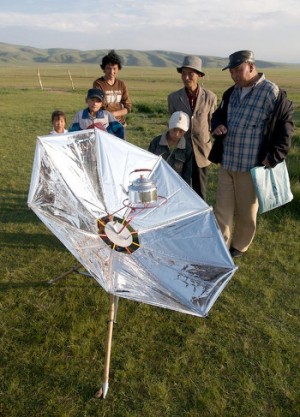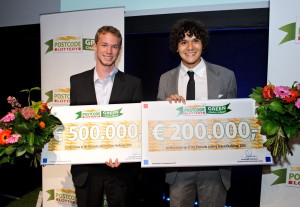 The Postcode Lottery Green Challenge award is a startup competition run by the Dutch Postcode Lottery with 500,000 EU ($666,200) up for grabs for the winner and 200,000 EU ($260,500) for the runner-up. All entries must have the potential to reduce greenhouse-gas emissions in a measurable fashion. From an impressive field of young entrepreneurs, the jury chose 25-year old Scot Frank of One Earth Designs as the winner for his company’s SolSource solar oven.
The Postcode Lottery Green Challenge award is a startup competition run by the Dutch Postcode Lottery with 500,000 EU ($666,200) up for grabs for the winner and 200,000 EU ($260,500) for the runner-up. All entries must have the potential to reduce greenhouse-gas emissions in a measurable fashion. From an impressive field of young entrepreneurs, the jury chose 25-year old Scot Frank of One Earth Designs as the winner for his company’s SolSource solar oven.
SolSource was inspired by the time Frabj spent in the Himalayas (the product has been tested there for 3 years), where women spend many hours a day collecting dung and wood fuels for cooking and heating. This process leads to deforestation, and many tribes in the Himalayas are rapidly running out of their traditional fuel sources. Families also breathe toxic indoor air pollution from the fire. Indoor air pollution is one of the world’s biggest killers of children under five, claiming 1.6 million lives per year.
A solar oven concentrates light and heat from the sun into a small cooking area. While there are already many models on the market, they are often heavy, fragile, expensive or cannot be used in traditional cooking styles. The SolSource oven costs $10 and weighs only 6 kilos. The materials can usually be sourced locally and are durable. The reflective surface material has the shortest lifetime at 12 years. Frank estimates that if 2.5% of people in the developing world used a solar oven, it would save enough greenhouse gas emissions to make Europe carbon neutral.
The oven can also be used to produce electricity. Frank estimates that 2 hours of cooking time can produce enough electricity to run an average household in the target areas. This covers lighting and usage like charging cell phones. Given the number of people in developing countries who do not have access to electricity and cook with charcoal or wood, a solar oven can be a transformative technology. It frees up time for doing other work (in parts of China people spend 4-8 hours a day collecting fuel) and therefore improves the economic prospects of owners. The SolSource is also very suitable for use in natural disasters.
 The runner-up prize went to Jason Aramburu for Re:char. Re:char has developed a new process for creating charcoal from waste materials produced in agriculture. Charcoal is used widely in the developing world for cooking. Charcoal is often illegally produced from wood, which contributes to deforestation, especially given that the oldest trees produce the best charcoal.
The runner-up prize went to Jason Aramburu for Re:char. Re:char has developed a new process for creating charcoal from waste materials produced in agriculture. Charcoal is used widely in the developing world for cooking. Charcoal is often illegally produced from wood, which contributes to deforestation, especially given that the oldest trees produce the best charcoal.
Re:char’s biochar can be used for cooking or as a fertilizer, where it has been shown to double yields. Incorporating biochar into soil not only reduces carbon emissions but is a form of carbon sequestration. This means that part of the carbon dioxide that would otherwise be released when the original agricultural waste used to create the biochar was burnt, or rotted, is stored in the soil instead. A recent article in Nature claimed that biochar could potentially capture about 12% of human Co2 emissions.
A mobile biokiln from Re:char costs around $1,000. One kiln can offset 1,000 tons of C02 and serve 100 families. The company expects to operate a franchise model where the kiln is paid for in installments by the owner. The jury pointed out one possible downside of the franchise model, which is that the kiln could also be used to produce biochar from illegally logged trees.
Aramburu previously appeared in VentureBeat as part of an earlier biochar venture called Ecovolve, which aimed to produce electricity from waste products and produced biochar as a byproduct. Re:char was founded in 2008, and Businessweek recently named Aramburu one of the 25 most promising social entrepreneurs in the U.S.
VentureBeat's mission is to be a digital town square for technical decision-makers to gain knowledge about transformative enterprise technology and transact. Learn More
